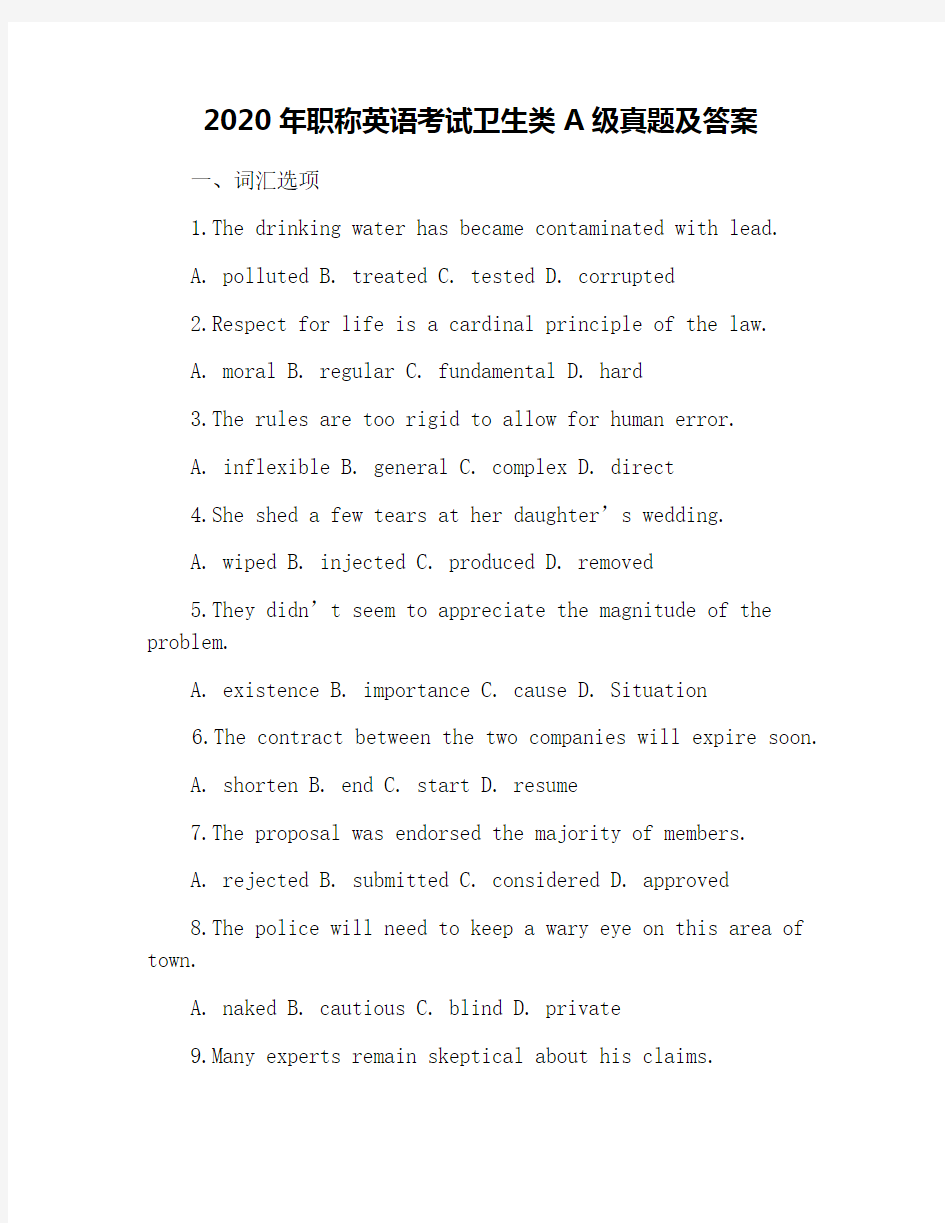2020年职称英语考试卫生类A级真题及答案

- 1、下载文档前请自行甄别文档内容的完整性,平台不提供额外的编辑、内容补充、找答案等附加服务。
- 2、"仅部分预览"的文档,不可在线预览部分如存在完整性等问题,可反馈申请退款(可完整预览的文档不适用该条件!)。
- 3、如文档侵犯您的权益,请联系客服反馈,我们会尽快为您处理(人工客服工作时间:9:00-18:30)。
2020年职称英语考试卫生类A级真题及答案
一、词汇选项
1.The drinking water has became contaminated with lead.
A. polluted
B. treated
C. tested
D. corrupted
2.Respect for life is a cardinal principle of the law.
A. moral
B. regular
C. fundamental
D. hard
3.The rules are too rigid to allow for human error.
A. inflexible
B. general
C. complex
D. direct
4.She shed a few tears at her daughter’s wedding.
A. wiped
B. injected
C. produced
D. removed
5.They didn’t seem to appreciate the magnitude of the problem.
A. existence
B. importance
C. cause
D. Situation
6.The contract between the two companies will expire soon.
A. shorten
B. end
C. start
D. resume
7.The proposal was endorsed the majority of members.
A. rejected
B. submitted
C. considered
D. approved
8.The police will need to keep a wary eye on this area of town.
A. naked
B. cautious
C. blind
D. private
9.Many experts remain skeptical about his claims.
A. doubtful
B. untouched
C. certain
D. silent
10.Rumors began to circulate about his financial problems.
A. send
B. spread
C. hear
D. confirm
11.Three world-class tennis players came to content for this title.
A. argue
B. claim
C. wish
D. compete
12.The tower remains intact ever after two hundred years.
A. unknown
B. unusual
C. undamaged
D. unstable
13.The methods of communication used during the war were primitive.
A. simple
B. reliable
C. effective
D. alternative
e out, or I’ll bust the door down.
A. shut
B. set
C. break
D. beat
15.This species has nearly died out because its habitat
is being destroyed.
A. turned dead
B. passed by
C. carried away
D. become extinct
参考答案:ACAAB BDBAB DCACD
第2部分:阅读判断(第16-22题,每题1分,共7分)
In Your Face
Why is this man so angry? We don't know the reason, but we can see the emotion in his face. Whatever culture you come from, you can expressing.
Forty years ago, psychologist Paul Ekman of the
University of California, San Francisco, became interested in how people's faces show their feelings. He took photographs of Americans expressing various emotions. Then he showed them to the Fore people, who live in the jungle in New Guinea. Most of the Fore had never seen foreign faces, but they
easily understood Americans' expressions of anger, happiness, sadness, disgust, fear, and surprise.
Then Ekman did the same experiment in reverse. He showed pictures of Fore faces to Americans, and the results were similar. Americans had no problems reading the emotions on the Fore people's faces. Ekman's research gave powerful support to the theory that facial expressions for basic emotions are the same everywhere. He did more research in Japan, Brazil, and Argentina, and got the same results.
According to Ekman, these six emotions are universal because they are built into our brains. They developed to help us deal with things quickly that might hurt us. Some emotional triggers are universal as well. When something suddenly comes into sight, people feel fear, because it might be dangerous. But most emotional triggers are learned. For example, two people might smell newly cut grass. One person spent wonderful summers in the country as a child, so the smell makes him happy. The other person remembers working very hard on a farm and being hungry, so he feels sad.
Once we make an emotional asssociation in our brain,it is diffficult,and sometiomes impossible,to change it.”Emotions is the least changeable part of the brain,”says Ekman.But we can learn to manage our emotions better. For instance, we can
